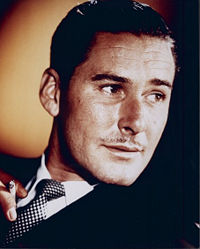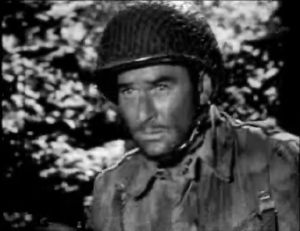Errol Flynn
| Errol Flynn | |
 Errol Flynn c.1940 | |
| Birth name: | Errol Leslie Thomson Flynn |
|---|---|
| Date of birth: | June 20 1909 |
| Birth location: | |
| Date of death: | October 14 1959 (aged 50) |
| Death location: | |
| Spouse: | Lili Damita) Nora Eddington) Patrice Wymore) |
Errol Leslie Thomson Flynn (June 20, 1909 – October 14, 1959) was an Australian film actor, most famous for his romantic swashbuckler roles in Hollywood films and his flamboyant lifestyle.
Youth
Born in Hobart, Tasmania, he was taken to Sydney, New South Wales as a child, where he attended Sydney Church of England Grammar School ("Shore") from which he was expelled for fighting and, allegedly, having sex with the daughter of the school laundress [citation needed]. He was also expelled from the next school he attended. Shortly afterwards, he moved to New Guinea where he bought a tobacco plantation, a business which failed. A copper mining venture in the hills near the Laloki Valley behind the present national capital Port Moresby also failed.
In 1933, he starred in the American-made film In the Wake of the Bounty directed by Charles Chucker. In the early 1930s, Flynn left for Britain and, in 1933, got an acting job with Northampton Repertory Company, where he worked for seven months. According to Gerry Connelly's Book Errol Flynn in Northampton, he also performed at the 1934 Malvern Festival, and also in Glasgow and in London's West End. He was discovered by a Warner Bros. executive, signed to a contract and shipped to America as a contract actor. In 1942, he became a naturalized citizen of the United States.
Acting career
Flynn became an overnight sensation with his first starring role, Captain Blood, in 1935. He became typecast as a swashbuckler and made a host of such films, including The Adventures of Robin Hood (1938), The Dawn Patrol (1938) with his close friend David Niven, Dodge City (1939), The Sea Hawk (1940), and Adventures of Don Juan (1948).
Flynn played opposite Olivia de Havilland in eight films, including Captain Blood, The Charge of the Light Brigade (1936), The Adventures of Robin Hood, Dodge City, Santa Fe Trail (1940), and They Died with their Boots On (1941). Film historian Rudy Behlmer asserted that during the filming of Robin Hood, de Havilland and Flynn were romantically involved (see the Special Edition of Robin Hood on DVD, 2003), but de Havilland herself has disputed this. Their relationship was, she said in an interview for Turner Classic Movies, platonic, mostly because Flynn was already married to Lili Damita. The Adventures of Robin Hood was Flynn's first in Technicolor.
During the shooting of The Private Lives of Elizabeth and Essex (1939), Flynn and co-star Bette Davis had some legendary off-screen fights, with Davis striking him harder than necessary while filming a scene. Their relationship was always strained, but Warner Brothers teamed them up twice. Their off-screen relationship was later reconciled. A contract was even presented to lend them out as Rhett Butler and Scarlett O'Hara in Gone with the Wind but the teaming failed to materialize. Davis claimed she turned down the role, refusing to work with Flynn, but researchers later revealed that Davis was never seriously considered for the part.[citation needed]
Flynn was a member of Hollywood's Cricket Club, along with David Niven. His suave, debonair, and devil-may-care attitude towards both ladies and life has been immortalized in the English language by author Benjamin S. Johnson as "Errolesque" in his treatise on the subject, An Errolesque Philosophy on Life. [1]
By the 1950s, Flynn had become a parody of himself. Heavy alcohol and drug abuse left him prematurely aged and bloated, but he still won acclaim as a drunken ne'er-do-well in The Sun Also Rises (1957). His colorful but somewhat exaggerated [citation needed] autobiography, My Wicked, Wicked Ways, was published just months after his death and contains humorous anecdotes about Hollywood. Flynn wanted to call the book In Like Me, but the publisher refused. In 1984, CBS produced a television mini-series based on Flynn's autobiography, starring Duncan Regehr as Flynn.
In the 1950s, Flynn tried his hand as a novelist, penning the adventure novel Showdown, which was published in 1952.
Private life, family and death
Lifestyle
Flynn was famous for his drinking, womanizing, and brawling. His freewheeling, hedonistic lifestyle caught up with him in November 1942 when teenagers Betty Hansen and Peggy Satterlee accused him of statutory rape.[2] A group was organized to support Flynn, named the American Boys Club for the Defense of Errol Flynn (ABCDEF); its members included, surprisingly, William F. Buckley, Jr. The trial took place in January and February of 1943, and Flynn was cleared of the crime. The incident served to increase his reputation as a ladies' man, which led to the popular belief that the term "in like Flynn" was based on Flynn's romantic exploits.
Although kept well hidden from the public so as not to tarnish his clean-cut screen persona, it was an open secret in Hollywood that Flynn had a voracious sexual appetite. He had countless affairs, flings, and trysts with women.
Marriages
Flynn was married three times, to actress Lili Damita from 1935 until 1942 (one son, Sean Flynn); to Nora Eddington from 1943 until 1948 (two daughters, Deirdre and Rory); and to actress Patrice Wymore from 1950 until his death (one daughter, Arnella Roma). In Hollywood he tended to refer to himself as Irish rather than Australian. His father Theodore Thomson Flynn was a biologist and a professor at the Queen's University of Belfast in Northern Ireland for the latter part of his career. Flynn lived with Wymore in Port Antonio, Jamaica in the 1950s. He was largely responsible for developing tourism to this area, for a while owned the Titchfield Hotel, decorated by the artist Olga Lehmann, and popularised raft trips down rivers on bamboo rafts.[3]
In the late 1950s, Flynn met the 15-year-old Beverly Aadland at the Hollywood Professional School, whom he courted during his last few years, and cast in his final film, Cuban Rebel Girls (1959). According to Aadland, he planned to marry her and move to their new house in Jamaica, but during a trip together to Vancouver, British Columbia, he died of a heart attack. His only son, Sean, became an actor and later a war correspondent, who disappeared in Cambodia in 1970 during the Vietnam War. The younger Flynn's life was recounted in Inherited Risk by Jeffrey Meyers (Simon & Schuster).
Death
Numerous legends surround Flynn's death. According to Vancouverhistory.ca, Flynn flew with Aadland to Vancouver on October 9, 1959, to sell his yacht Zaca to millionaire George Caldough. On October 14, Caldough was driving Flynn to the airport when Flynn felt ill. He was taken to the apartment of Caldough's friend, Dr. Grant Gould, uncle of noted pianist Glenn Gould. A party ensued, with Flynn regaling guests with stories and impressions. Feeling ill again, he announced "I shall return" and retired to a bedroom to rest. A half hour later, Aadland checked in on him and discovered him unconscious, due to suffering a massive heart attack. According to the Vancouver Sun on December 16, 2006, "When Errol Flynn came to town in 1959 for a week-long binge that ended with him dying in a West End apartment, his local friends propped him up at the Hotel Georgia lounge so that everyone would see him."
He is interred in Forest Lawn Memorial Park Cemetery, in Glendale, California. He shares coffin space with six bottles of whiskey, a parting gift from his drinking buddies. Both his parents survived him.
Post-death controversy
In 1980, author Charles Higham published a controversial biography, Errol Flynn: The Untold Story in which he alleged that he was a fascist sympathizer who spied for the Nazis before and during World War II. In Disney's film The Rocketeer (1991), the major villain, Neville Sinclair, was a 1930s Hollywood actor who spied for the Nazis in an obvious reference to Higham's allegations about Flynn. The book also alleged he was bisexual, and had affairs with Tyrone Power, Howard Hughes, and Truman Capote. Subsequent biographies — notably Tony Thomas' Errol Flynn: The Spy Who Never Was (Citadel, 1990) and Buster Wiles' My Days With Errol Flynn: The Autobiography of a Stuntman (Roundtable, 1988) — have denounced Higham's claims as fabrications. Flynn's political leanings appear to be leftist. He was a supporter of the Spanish Republic in the Spanish Civil War and of the Cuban Revolution, even narrating a documentary titled Cuban Story[4] shortly before his death.
Film portrayals
- Guy Pearce played Errol Flynn in the 1996 Australian film Flynn.
- Flynn was portrayed by Jude Law in Martin Scorsese's 2004 film The Aviator.
- The character of film star Neville Sinclair, played by Timothy Dalton in the 1991 film The Rocketeer, was thought by many film critics to be loosely based on Flynn.
- The character of Alan Swann, portrayed by Peter O'Toole in the 1982 film My Favorite Year appears to be loosely based on Flynn.
Filmography
Bibliography
Flynn wrote the following books:
- Beam Ends (1937)
- Showdown (1946)
- My Wicked, Wicked Ways (1959)
In pop culture
- The phrase "In like Flynn" is widely believed to have come about after his 1943 acquittal on the rape charge, but some have felt that the phrase came about earlier possibly due to the rhyming of '"in" with "Flynn"
- English rock band The Dogs D'Amour named an album "Errol Flynn".
- American Alt rock band Dramarama mentioned him in their song "Last Cigarette" with the lyrics "Hey hey its been so long since I have written with pen, Ya know its sharper than a sabre, I dont feel like Errol Flynn"
- Australian rock band Australian Crawl's 1981 album Sirocco contained the hit song "Errol", in honour of Errol Flynn. The song roughly charts his rise in Hollywood and subsequent downfall.
- The Marvel Comics character Nightcrawler is a great admirer of Flynn and models much of himself after him.
- Detroit Rapper "Esham" recently made a song about the "Errol Flynn" dance.
- Bob Dylan mentions Errol Flynn in his song "Foot Of Pride"
- In the Nick Hornby novel High Fidelity, the main character refers to Errol Flynn as "preposterously endowed" in a monologue about the ability of men without extraordinary characteristics to have multiple lovers.
- DC Comics' Green Arrow was trained in Archery by Flynn, and would later base his heroic persona after the man. This is an obvious reference to Flynn's turn as Robin Hood in the 1938 film.
ReferencesISBN links support NWE through referral fees
External links
- Errol Flynn at the National Film and Sound Archive
- Errol Flynn at the Internet Movie Database
- Map of where Errol died in Vancouver
- Profile for Errol Flynn at Find A Grave
- Errol Flynn on CBC's Front Page Challenge
- The Pirate's Daughter by Margaret Cezair-Thompson
- Wu Ming's "In Like Flynn" at Chicago Review
- Errol Flynn Resource Website Flynn resource website, filmography & photographs.
- Profile @ Turner Classic Movies
Credits
New World Encyclopedia writers and editors rewrote and completed the Wikipedia article in accordance with New World Encyclopedia standards. This article abides by terms of the Creative Commons CC-by-sa 3.0 License (CC-by-sa), which may be used and disseminated with proper attribution. Credit is due under the terms of this license that can reference both the New World Encyclopedia contributors and the selfless volunteer contributors of the Wikimedia Foundation. To cite this article click here for a list of acceptable citing formats.The history of earlier contributions by wikipedians is accessible to researchers here:
The history of this article since it was imported to New World Encyclopedia:
Note: Some restrictions may apply to use of individual images which are separately licensed.

